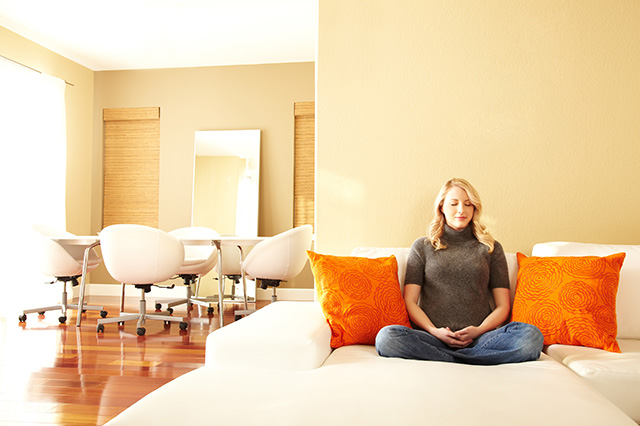New Year’s resolutions tend to focus on physical health – exercising more, eating better, losing weight. While there’s nothing wrong with this type of resolution, deciding to focus on emotional and mental health could be a more beneficial approach if you’ve been stressed out this past year.
Go for a different take on the idea of “new year, new you,” and focus on your emotional well-being this year.
Addressing Your Mental and Emotional Health
Just as mental health “affects how we think, feel and act,” writes MentalHealth.gov, “it also helps determine how we handle stress, relate to others and make choices.”
One of the best ways to improve mental health is to make informed, healthy choices that support both your physical and emotional well-being. Thankfully, there are plenty of coping and relaxation techniques you can try from the comfort and safety of home, along with resources you can access online.

Prioritize Your Mind, Time and Relationships
Focusing on the activities, people and causes/organizations that make you feel happy and engaged is a key part of a successful mental reset.
Engage Your Brain
Identify the major stressors in your life and manage stress better with the four As: avoid, alter, accept and adapt. When it comes to resolutions, consider focusing on work-life balance – especially if you’re hybrid or working from home – and try giving yourself more free time.
Make the most of that spare time by doing some mentally and emotionally enriching activities. Learning a language, recipe or photography technique, playing brain games and meditating can help you deal with stress and better your mental health.
Connect With Others
Having a support system – or a network of people who care, respect and support you – is an essential part of emotional well-being.
Stay connected to your support system even (or especially) when you’re struggling. Reach out to friends and family to plan get-togethers, or even just to talk.
Planning a trip to a park or hiking trail for a walk on a nice day is also something you can look forward to.
Try to Stay Positive
Being optimistic isn’t always easy, especially during times of uncertainty. Try to focus on things that bring you happiness, like baking, dancing, singing or making art. Watch your favorite uplifting movie or spend some quality time with a pet, your child or significant other.
Make yourself feel better inside and out with self-care, too. Give yourself a DIY spa day with a relaxing bath, new facemask or foot scrub. Start a new healthy habit like meditating or writing in a gratitude journal to keep track of the things you’re thankful for or would like to try in the future.
Do Good Deeds
It’s no myth that making others happy can help you feel happier too. Engaging in meaningful activities or becoming an active participant in your community can help your mental and emotional health.
Start small with tending to houseplants or gardening when the weather gets nicer. Take care of the planet by picking up litter, or choose to improve the life of an animal by fostering, adopting or donating to a shelter.
Get out in your community by volunteering at causes that are important to you, making charitable donations (like clothes, food, money and other supplies) and forming new connections.

Maintain a Healthy Lifestyle
Mental and emotional health are deeply intertwined with physical wellbeing. This means staying active, getting enough sleep and eating well can all help improve your mental health, too.
Physical Activity
Just a bit of exercise can help improve your mood, make you feel more energized and potentially help you sleep more soundly at night.
Focusing on simply making yourself feel better, rather than counting calories or measuring your waistline, can also make exercise more enjoyable.
Try starting with low-impact exercises like yoga. Outdoor exercises like biking, hiking and walking are also extremely beneficial because they get you outside in the natural light and fresh air.
Sleeping Well
The impact of sleep on your mood goes far beyond simply feeling grouchy in the morning. Getting enough rest is vital to overall mental and emotional health.
Not getting enough sleep can lead to obvious inconveniences, like low energy and irritability, but prolonged sleep deprivation can cause bigger issues.
“Studies in both adults and children suggest that sleep problems may raise risk for, and even directly contribute to, the development of some psychiatric disorders,” states Harvard Health Publishing.
A great way to make sure you have enough sleep is to give yourself a bedtime, even if you’re far too old for one. Having a set time you go to sleep and wake up every day can ensure that you feel tired when you’re supposed to, and energized when you need to be.
Eating Better
Eating a healthy, well-balanced diet – not crash dieting – can impact your mood and even your immunity.
“Multiple studies have found a correlation between a diet high in refined sugars and impaired brain function – and even a worsening of symptoms of mood disorders, such as depression,” according to Harvard Health Publishing.
Make sure you’re drinking plenty of water and eating enough high-quality foods, like fruits, vegetables and whole grains. You can also try making healthier versions of your favorite comfort foods by incorporating more vegetables, eating more salads and reaching for less processed snacks.
| Self-Care Essentials | ||||
|---|---|---|---|---|
 | Clever Fox Self-Care Journal – Wellness & Daily Reflection Notebook – Mental Health & Personal Development Journal – Self Care Planner, Meditation & Mood Journal for Women & Men – A5 Size (Light Blue) | PrimeEligible | Buy Now | |
 | BEST 100 Daily Meditation Cards | Anxiety Relief Item for Relaxation | Self Care Kit for Stress Relief | Perfect Mindfulness Gift For Teens & Adults | Advance Beyond Positive Affirmations | PrimeEligible | Buy Now | |
 | Candescent Stress Balls - Hand Therapy Relief for Anxiety, Fidget, Tension, Exercise Strengthener - Motivational Toys for Adults & Kids - Set of 2 | PrimeEligible | Buy Now | |
 | MoCuishle Shiatsu Neck Back Massager Pillow with Heat, Deep Tissue Kneading Massage for Back, Neck, Shoulder, Leg, Foot, Gift for Men Women Mom Dad, Stress Relax at Home Office and Car | PrimeEligible | Buy Now | |
 | LifeAround2Angels Bath Bombs Gift Set 12 USA made Fizzies, Shea & Coco Butter Dry Skin Moisturize, Perfect for Bubble Spa Bath. Handmade Birthday Mothers day Gifts idea For Her/Him, wife, girlfriend | PrimeEligible | Buy Now | |
 | Nalgene Sustain Tritan BPA-Free Water Bottle Made with Material Derived from 50% Plastic Waste, 32 OZ, Wide Mouth, Trout Green | PrimeEligible | Buy Now |
How do you want to improve your emotional and metal health this year? Tell us in the comments.
When you make a purchase through a third-party link, AAA Northeast could receive revenue. As an Amazon Associate, we earn from qualifying purchases.

















